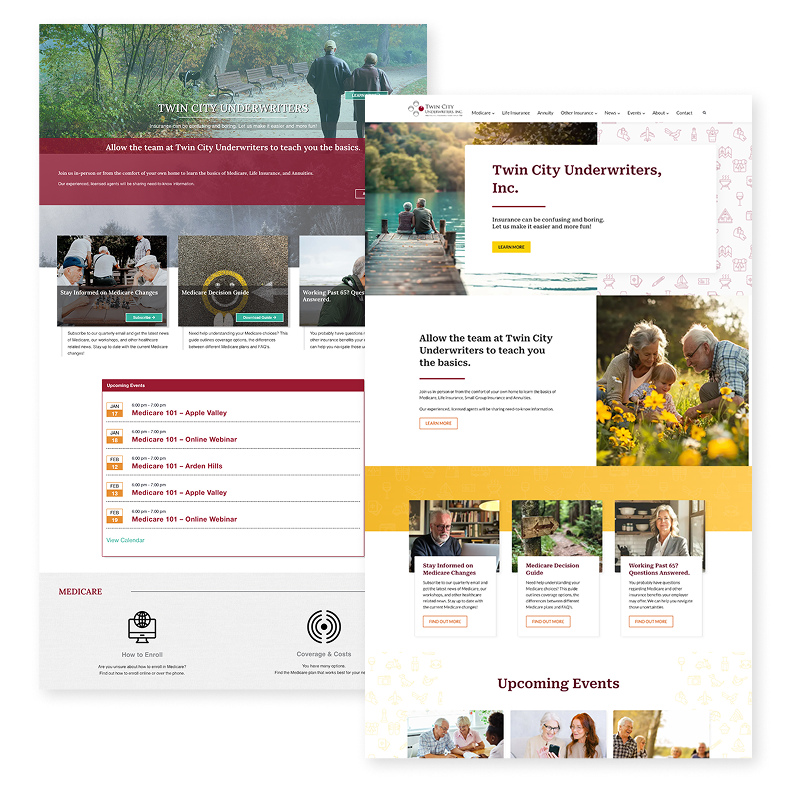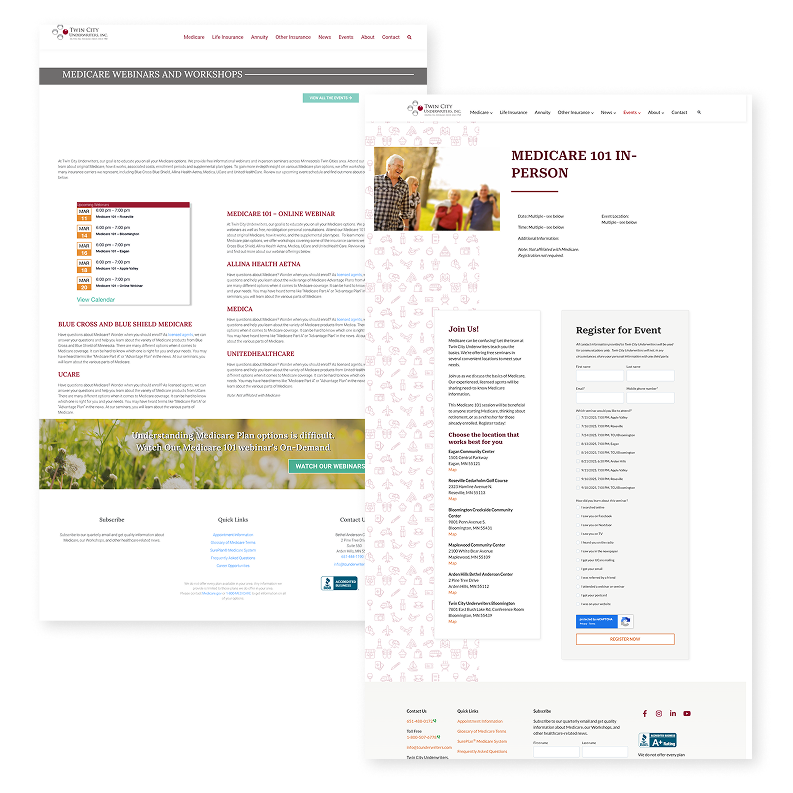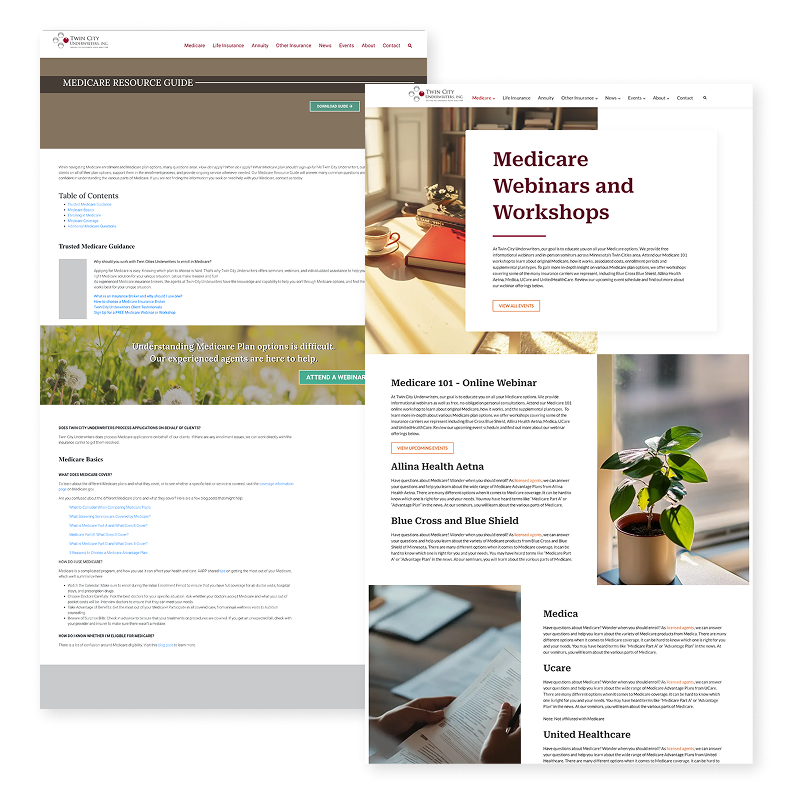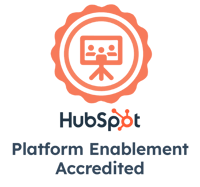The Challenge
TCU speaks to an audience that's slow to trust. The best connections occur at in-person or virtual events, where trust can be established and nurtured. The key is getting their audience to register for these events and to actually attend.
One of the biggest challenges for TCU was that their website was built with antiquated technology, and they had to send all changes to a third party to execute. With new events each month that need to be uploaded to the site, this slow process wasn’t sustainable.
As a result of new events not making it to the site, workshops saw low registration. Those who registered didn’t always show up or take action afterward, primarily due to a lack of reminders to registrants leading up to the event, as well as a lack of timely follow-up with prospects after they attended. This made it difficult to achieve results.
Additionally, TCU sought to increase awareness of its supplementary services. In addition to Medicare, they also provide information and resources on life insurance, annuities, and other complementary products. These are also easier to promote once they’ve earned the trust of a prospective client.
Finally, there was one other major challenge: staying agile. Medicare is constantly changing, as is the behavior of those approaching Medicare age. Sticking with the status quo for years on end was detrimental to TCU’s growth. They needed a site that could adapt to changes as they occurred.
Client Priorities
- Constantly update the site with new events that are easy to register for, and remove past events to declutter the registration page
Increase both the number of registrants and the registration-to-attendees percentage
Promote complementary services without turning off prospects
Keep the website agile to reach new audiences and stay on top of major shifts
The Plan
We identified that the best way to meet TCU’s challenges was through a major overhaul of their website and marketing strategy.
To increase event registrations, TCU needed a solid strategy and system in place for creating conversion-optimized registration pages. To get these pages in front of a wider audience, they needed a comprehensive digital marketing strategy.
In order to help nurture registrants into attendees, we identified and created a repeatable, automated marketing strategy of customer-oriented reminder emails. These emails are delivered at a data-backed cadence to help keep the upcoming event top of mind and desirable to attend.
To help promote the complementary services, we identified inbound marketing as an ideal tactic. This self-serve and nurturing-based approach appealed to TCU’s target audience, which is highly trust-based. Our inbound campaigns would provide useful and proactive information for each stage of the buyer’s journey as the leads crossed it. We promoted these campaigns using email marketing, social media posts, and pay-per-click advertising on multiple platforms.
To keep the site agile and constantly evolving, we identified Growth-Driven Design (GDD) as the most effective tactic. Unlike the traditional set-it-and-forget-it model, GDD is a continuous process of incremental improvements to a website based on data. For TCU, this was a more effective tactic, as it allowed us to tailor the site to match changing user behavior and update necessary information each year. This also helps TCU stay ahead of its competition, which is not as agile and reactive. This was supported by an overall website redesign with fresh new content as a starting point.
The Results
21%
increase in event attendance
34%
increase in blog traffic
The new website made it easy for the TCU team to make content updates on the fly without needing to involve a developer. The improved navigation and optimized content made it easier for website visitors to find the information they were looking for, while also enticing them to sign up for an event.
The simplification of the registration process and the use of automated reminders increased both event registration and attendance for both webinars and in-person events. This foot in the door proved to be a highly effective future conversion path for TCU. Once a visitor registered for and attended an event, they were highly likely to then go on to become a customer.
The inbound campaigns proved to be an effective way to promote supplementary services. TCU experienced a significant increase in engagement with inbound campaigns compared to outbound efforts, as well as a higher likelihood of conversion. Inbound campaigns were also used as supporting collateral for post-event nurturing, which further increased the number of leads who convert to customers.
The new, agile site is designed to meet current accessibility and UX standards, and is also primed to adapt as these standards evolve. Likewise, the site utilizes data gathering and analysis to inform continuous improvement updates. This allows TCU to adjust their messaging, flow, and experience to mature the buyer’s journey of their target audience as it shifts and changes.
Thanks to a smarter event strategy, a flexible new website, and ongoing inbound campaigns, TCU has not only increased event attendance but also built a stronger, more agile marketing engine that drives trust, engagement, and long-term growth.
Before and After






